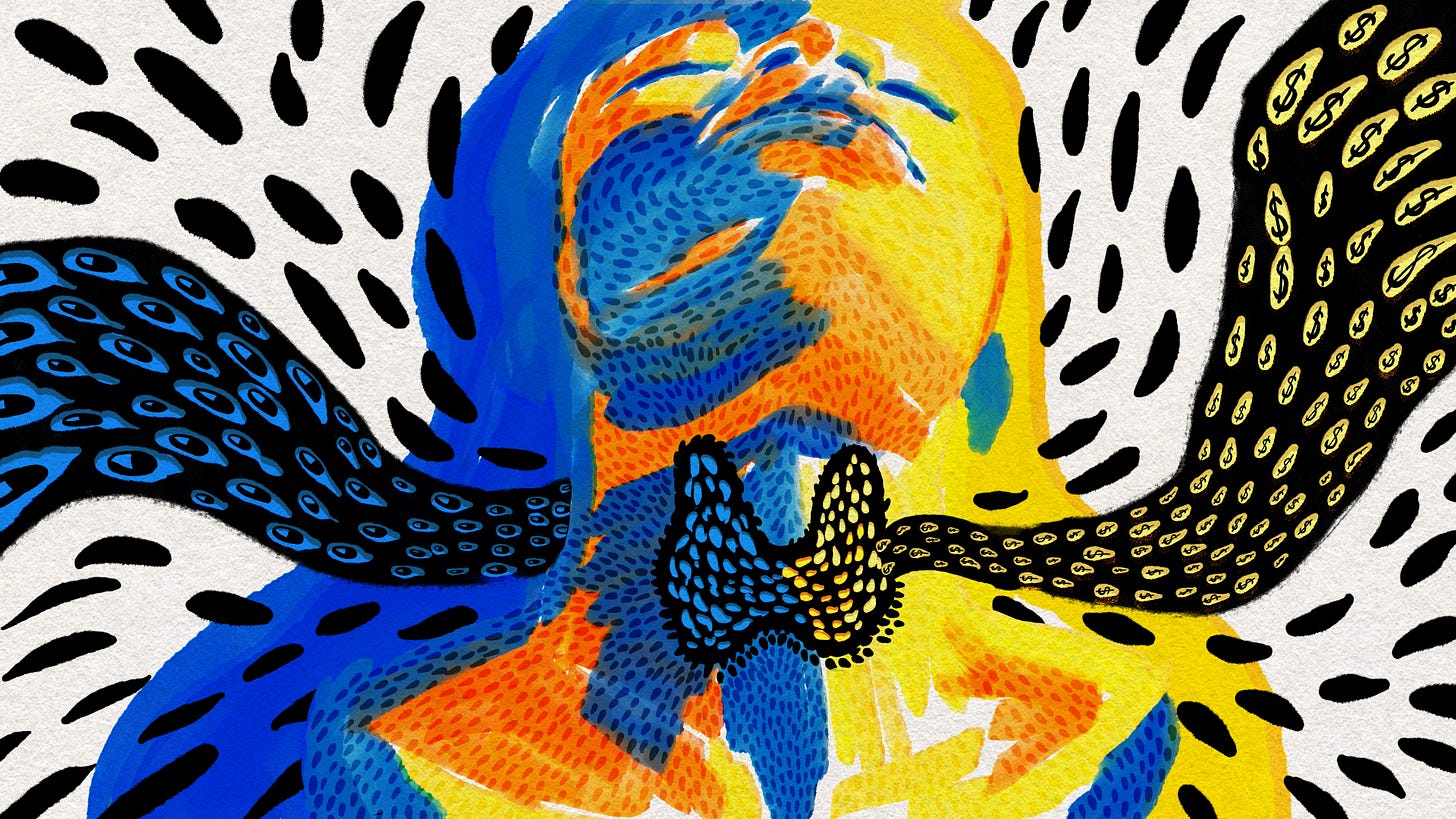My Substack is a reader-supported publication. To gain access to all of my articles and podcast episodes in full and to allow me to continue devoting my time and effort to my writing, consider becoming a paid subscriber ($15 per month or $99 for a yearly subscription).
The full version of this article is for paid subscribers only.
Disclaimer: Content for entertainment purposes only. Not medical or health advice.
Hashimoto’s thyroiditis is the most common cause of hypothyroidism in developed nations eating diets adequate in iodine.
It is considered an autoimmune disease in which the immune system slowly destroys the thyroid gland. The currently accepted theory behind autoimmune thyroiditis in mainstream medicine is that the immune system develops antithyroid antibodies that attack the thyroid tissue, causing progressive fibrosis, destruction and failure of the gland.
Both allopathic and alternative medicine subscribe to this view, however, they have different views as to what triggers the “attack.”
The key explanation behind what causes Hashimoto’s thyroiditis in allopathic medicine is a genetic predisposition that leads to immune alterations in which the immune system becomes “confused” and self-destructive, proceeding to attack and destroy thyroid cells.
On the other hand, alternative medicine explains the cause of the immune “confusion” in Hashimoto’s through the lens of leaky gut and molecular mimicry.
“Leaky gut” is described as a condition in which the tight junction proteins that connect the epithelial cells making up the lining of the small intestine become destabilized, allowing particles from within the intestine to reach the bloodstream. Once this destabilization takes place (triggered by various factors, such as psychological stress or certain bacterial species), certain proteins from the digestive tract can make it into the bloodstream.
The immune system will memorize the protein sequence of these molecules to remember how to better recognize and attack them in the future. However, since the gluten and casein proteins (casein being found in dairy) look similar to the structure of thyroid cells, this point of view subscribes to the idea that the immune system can get “confused” after learning to attack gluten and casein, mistaking thyroid cells for gluten and casein, and proceeding to attack them. This process is called “molecular mimicry.”
While gut health is definitely involved in Hashimoto’s and other forms of autoimmune thyroiditis, I think that the current explanation for what causes autoimmune thyroiditis (or autoimmune disorders in general) is not the full story. Perhaps there is a large gap in the perception of what the immune system is doing.
What if the immune system is not attacking and destroying thyroid cells? What if the immune system is cleaning up the debris of cells that have already been destroyed, and the presence of “anti-thyroid” antibodies is just a sign that the immune system’s “clean up” crew is doing exactly what it’s meant to do?
If what’s indeed happening is that the immune system is cleaning up damage as opposed to causing damage, the part of the riddle of Hashimoto’s that remains unsolved is - What is causing damage to the thyroid gland?
To begin investigating it through this lens we need to explore two interesting pieces of information that we know about Hashimoto’s thyroiditis.
Why is it that up to 85% of those affected by the disease are women?
Why is the disease named after a Japanese doctor?
While these questions might seem strange, answering them provides indispensable clues toward a better understanding of Hashimoto’s. An understanding that is not so disempowering and doesn’t simply assume that your body is a confused mess attacking itself.
In this article:
A different view of the immune system
How did our understanding of the immune system come about?
The shaky theory behind the currently accepted framework of the immune system
Is the immune system attacking or cleaning up?
The remodelling of the immune system in Hashimoto’s disease
Iodine, estrogen, and energy failure
Can iodine be involved in Hashimoto’s thyroiditis?
Why women are more affected than men
Energy metabolism and why various stressors can trigger Hashimoto’s
Is it necessary to avoid gluten and dairy if you have Hashimoto’s?
The role of gut dysbiosis and bacterial overgrowth in Hashimoto’s
The energy metabolism and “leaky gut” connection
Why “autoimmune diets” don’t always work
How to start healing Hashimoto’s
Supporting energy metabolism & addressing deficiencies
Creating a supportive diet
Dampening the Th1 response
Addressing gut health




